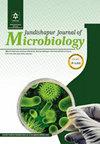Increasing Antimicrobial Resistance of Gram-Positive Cocci in the Nostrils of Health Care Workers in the Post–COVID-19 Era Compared to Pre–COVID-19 Era in North Khorasan, Iran
IF 0.5
4区 医学
Q4 MICROBIOLOGY
引用次数: 0
Abstract
Background: In the COVID-19 era, co-infections can lead to an increase in morbidity and mortality. Normal flora bacteria can transfer to the pulmonary tract and create bacterial co-infections. The nasal cavity is one of the main areas housing normal flora in the human body. Objectives: In this study, we evaluated the prevalence and antibiotic resistance of gram-positive cocci in the pre– and post–COVID-19 eras among health care workers. Methods: We assessed 376 nasal swabs from the pre–COVID-19 era and 376 from the post–COVID-19 era. Conventional and molecular methods were used to identify bacterial types and evaluate antimicrobial resistance. Results: The most common gram-positive cocci in the pre–COVID-19 samples were Staphylococcus aureus, S. epidermidis, S. capitis, S. hominis, S. haemolyticus, Streptococcus pneumoniae, and Enterococcus faecalis. In the post–COVID-19 samples, the most common gram-positive cocci were S. aureus, S. epidermidis, S. warneri, S. hominis, and E. faecalis. We observed higher resistance rates in post–COVID-19 samples, as well as resistance to linezolid and vancomycin in S. aureus, S. epidermidis, and S. hominis. Additionally, our isolates showed a high resistance rate to antiseptics. Conclusions: It seems that after the beginning of the COVID-19 pandemic, due to the change in the protective procedures in hospitals, the prevalence and variety of bacteria have decreased, but instead, they have been replaced by more pathogenic bacteria with higher antibiotic resistance.伊朗北呼罗珊地区后covid -19时代与前covid -19时代相比,医护人员鼻孔中革兰氏阳性球菌耐药性增加
背景:在新冠肺炎时代,合并感染可能导致发病率和死亡率增加。正常菌群细菌可以转移到肺部并产生细菌共感染。鼻腔是人体内容纳正常菌群的主要区域之一。目的:在本研究中,我们评估了新冠肺炎前后医护人员中革兰氏阳性球菌的流行率和抗生素耐药性。方法:我们评估了376份新冠肺炎前时期和376份新冠肺炎后时期的鼻拭子。常规和分子方法用于鉴定细菌类型和评估抗微生物耐药性。结果:新冠肺炎前样本中最常见的革兰氏阳性球菌为金黄色葡萄球菌、表皮葡萄球菌、头状葡萄球菌、人型葡萄球菌、溶血性葡萄球菌、肺炎链球菌和粪肠球菌。在新冠肺炎后样本中,最常见的革兰氏阳性球菌为金黄色葡萄球菌、表皮葡萄球菌、华氏葡萄球菌、人型葡萄球菌和粪大肠杆菌。我们在新冠肺炎后样本中观察到较高的耐药性,以及金黄色葡萄球菌、表皮葡萄球菌和人型葡萄球菌对利奈唑胺和万古霉素的耐药性。此外,我们的分离株对防腐剂表现出很高的耐药性。结论:新冠肺炎大流行开始后,由于医院防护程序的改变,细菌的流行率和种类似乎有所下降,但取而代之的是更多具有更高抗生素耐药性的致病菌。
本文章由计算机程序翻译,如有差异,请以英文原文为准。
求助全文
约1分钟内获得全文
求助全文
来源期刊

Jundishapur Journal of Microbiology
MICROBIOLOGY-
CiteScore
1.30
自引率
0.00%
发文量
56
审稿时长
6-12 weeks
期刊介绍:
Jundishapur Journal of Microbiology, (JJM) is the official scientific Monthly publication of Ahvaz Jundishapur University of Medical Sciences. JJM is dedicated to the publication of manuscripts on topics concerning all aspects of microbiology. The topics include medical, veterinary and environmental microbiology, molecular investigations and infectious diseases. Aspects of immunology and epidemiology of infectious diseases are also considered.
 求助内容:
求助内容: 应助结果提醒方式:
应助结果提醒方式:


